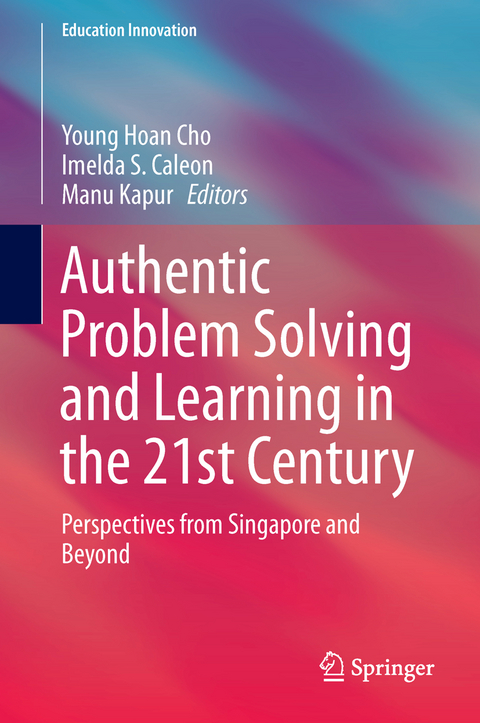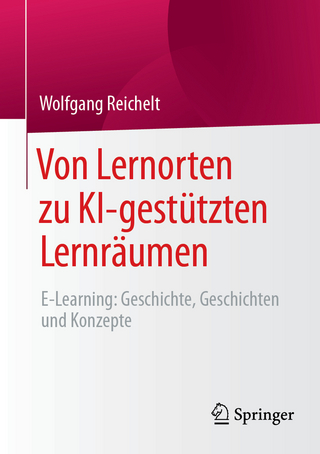
Authentic Problem Solving and Learning in the 21st Century
Springer Verlag, Singapore
978-981-287-520-4 (ISBN)
Young Hoan Cho is an assistant professor of Educational Technology in the Department of Education at Seoul National University, South Korea. He earned a PhD in information science and learning technologies from the University of Missouri, USA. He was previously a research scientist at the Office of Education Research, National Institute of Education, Singapore. His research focuses on problem-based learning environments, computer-supported collaborative learning, argumentation, and 3D virtual worlds. Imelda S. Caleon is Research Scientist at the Centre for research in Pedagogy and Practice, National Institute of Education, Singapore. Her research interests include conceptual change and development, informal learning, inquiry-based learning and creative-collaborative problem solving, particularly in relation to science education. Manu Kapur is an Associate Professor of Curriculum, Teaching, and Learning, as well as the Head of Research of the Learning Sciences Lab at the National Institute of Education (Singapore). His research examines the role of Productive Failure in learning and problem solving.
A. Introduction and Overview.- Chapter 1 Authentic Problem Solving and Learning for 21st Century Learners.- B. Authentic Problems and Tasks.- Chapter 2 The Roles of Authentic Tasks in Promoting 21st Century Learning Dispositions.- Chapter 3 A Design Model for Problem-based Learning.- Chapter 4 Mathematical Problem Solving Using Real-World Problems.- C. Problem-Based Learning Environments.- Chapter 5 Problem-based Learning: Conception , Practice, and Future.- Chapter 6 Using Problems to Learn in a Polytechnic Context.- Chapter 7 Pedagogical Interfaces in a Problem-based Learning Environment: Cognitive Functioning at PBL stages.- Chapter 8 Finding Common Ground during Collaborative Problem Solving: Pupils' Engagement in Scenario-based Inquiry.- D. Authentic Practice in School.- Chapter 9 Cultivating a Remix Movement in an East Asian Culture.- Chapter 10 Authentic Thinking with Argumentation: Putting on the Thinking Caps of Scientists and Designers.- Chapter 11 Using an Immersive Environment to Address Problems Associated with the Learning of Geography.- E. Authentic Practice through Productive Failure.- Chapter 12 Learning from Productive Failure.- Chapter 13 Discussing Student Solutions is Germane for Learning when Providing or Delaying Instruction.- Chapter 14 Mathematical Skills and Learning-By-Invention in Small Group.- F. Authentic Participation in Real-World Communities.- Chapter 15. The Retail Experience for Active Learning (REAL) Experience.- Chapter 16 Authentic Learning Experiences in Informal Science Learning: A Case Study of Singapore's Prospective Teachers.- Chapter 17 Exploring the Process of Problem Finding in Professional Learning Communities through a Learning Study Approach.- Chapter 18 Problem Solving of Teacher-generated Classroom Management Cases in Wiki-based Environment: An Analysis of Peers' Influences.- G. Conclusions and Future Direction.- Chapter 19 Authentic Problem Solving and Learning: Lessons Learned and Moving Forward.- Chapter 20Authentic Learning Research and Practice: Issues, Challenges, and Future Directions.
| Reihe/Serie | Education Innovation Series |
|---|---|
| Zusatzinfo | 27 Illustrations, color; 9 Illustrations, black and white; XI, 368 p. 36 illus., 27 illus. in color. |
| Verlagsort | Singapore |
| Sprache | englisch |
| Maße | 155 x 235 mm |
| Themenwelt | Schulbuch / Wörterbuch ► Unterrichtsvorbereitung ► Unterrichts-Handreichungen |
| Sozialwissenschaften ► Pädagogik ► Berufspädagogik | |
| Sozialwissenschaften ► Pädagogik ► Schulpädagogik / Grundschule | |
| Schlagworte | Authentic learning • Community of Practice • Educational technology • Learning Technologies • Problem-Based Learning • productive failure |
| ISBN-10 | 981-287-520-4 / 9812875204 |
| ISBN-13 | 978-981-287-520-4 / 9789812875204 |
| Zustand | Neuware |
| Haben Sie eine Frage zum Produkt? |
aus dem Bereich


